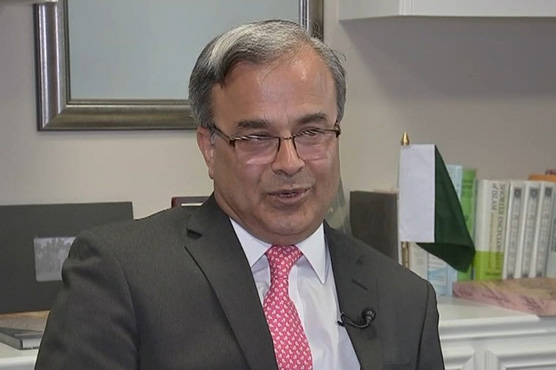India turned Kashmir into 'largest prison in the world': Asad Majeed

The ambassador maintained that the world has observed Pakistan's restraint and responsibility.
WASHINGTON (Dunya News) – Pakistan’s Ambassador to the United States Asad Majeed Khan, in his talk with Bloomberg, stated that India has shackled entire occupied-Kashmir, and “turned the whole valley into perhaps the largest prison in the world with about 12 million people being seen and watched by 900,000 troops.”
He spoke with Bloomberg’s Scarlet Fu and Caroline Hyde on ‘Bloomberg Markets: The Close’ and said: “This is a serious escalation right in our neighbourhood which we are very concerned about.”
The ambassador maintained that the world has observed Pakistan’s restraint and responsibility, even when India violated the state’s sovereignty by sending their jets following the Pulwama incident.
“Even in the face of that kind of aggression, our response was very measured, dictated by restraint,” he said, adding that Prime Minister Imran Khan had consistently spoke about Pakistan’s desire for peace [in the region] during his recent visit to the U.S.
Khan asserted that however under the current crisis escalation from the Indian side needed to be deescalated in order for the neighbouring countries to engage in dialogue.
In his response to “what would like Pakistan to see from the U.S. in terms of responding to Narendra Modi’s decision as the State Department has not addressed the legality of the move yet”, he stated that the State Department Spokesperson has clearly said that there is no change or shift in the U.S. policy to consider Kashmir as the disputed territory.
Importantly, he pointed out that U.S. President Donald Trump’s offer of mediation in resolving the longstanding the Kashmir issue was “itself a recognition of the existence of dispute that needs resolution.”
Khan mentioned that Pakistan welcomed the offer; however India didn’t accept the offer while the U.S. has an important role to play in addressing and helping two countries to engage in talks and urge India to “undo things that they have done in the last week in unleashing repression and arresting people and turning the valley into prison.”
When asked about additional steps which Pakistan could take independently, including possibility of more deployment of troops at the border, the ambassador stated that it could not have at a worse time for us [Pakistan].
“As you know, Pakistan is occupied on the western front […] and we’re doing whatever we can to facilitate the peace process in Afghanistan […] we are also trying to manage a border which is very treacherous, very porous to make sure no insurgents come into Pakistan,” he said, adding that the escalation could not come at ‘a more wrong time.’
The ambassador added that Pakistan needed to guard its sovereignty by preparing against any aggression that could come from India as it was done only a few months ago [following the Pulwama incident].
“We are prepared to meet any eventuality, but we are not going to resort to any action that would endanger peace and security in the region […] that is why we’re urging the international community to reciprocate the consistent offers of dialogue by the Prime Minister of Pakistan,” he concluded.
No change in U.S. policy on Kashmir
Yesterday, the United States outlined that there has been no change in its policy on Kashmir, as Washington continues to regard it as a territory disputed between India and Pakistan.
At a US State Department news briefing, spokesperson Morgan Ortagus des¬cribed Kashmir as “certainly an incredibly important issue” that the United States continued to “follow closely”.
“No,” said Ms Ortagus when questioned if there has been any change in the US policy on Kashmir. “No. And if there were, I certainly wouldn’t be announcing it here, but no, there’s not. Because we would let someone more important (person) like the president do that.”
Considering the strategic importance of the South Asian region, Ms Ortagus said that the U.S. has remained “incredibly engaged” with India and Pakistan over Kashmir and other issues.
She added: “We have a lot of engagement with India and Pakistan. Obviously, we just had Prime Minister Khan here, not just because of Kashmir.”
She said that while Kashmir was an “incredibly important issue”, there were “a host of (other) issues” on which the United States worked “quite closely” with both India and Pakistan.
When reminded about that Prime Minister Khan had accused India of planning genocide in Kashmir, Ortagus said: “I really don’t want to go beyond what we’ve said, because it’s such a tenuous issue. It’s something that we’re talking to them about quite closely.”
Pakistan has strongly reacted to India’s move to revoke occupied-Kashmir’s autonomy.

